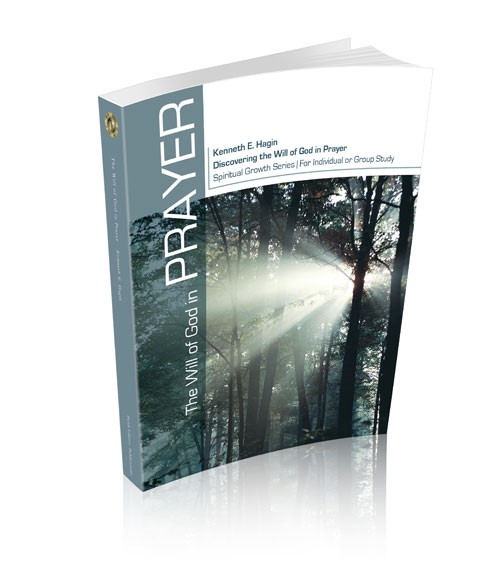Kenneth E. Hagin
In teaching on prayer for so many years, I always take two particular Bible texts. The reason I choose these two for my main texts is because I don’t believe there are any better.
These two texts will cover anything you want to teach on the subject of prayer. The first text I use is Ephesians 6:18, in which Paul is writing to the believers at Ephesus. The second text is John 15:7, which says, “If ye abide in me [Jesus], and MY WORDS abide in you, ye shall ask what ye will, and it shall be done unto you.”
This verse is all-inclusive, because Jesus said “My words.” Therefore, any word the Bible teaches on the subject of prayer is covered by John 15:7.
If Jesus had just said, “If you abide in Me,” we Christians would automatically have it made because we all abide in Him as believers. But Jesus added, “And My words abide in you.”
Have you ever noticed that many of God’s promises are conditional? If you want answers to your prayers, follow the instructions that have been given to you: If you abide in Jesus, and His Words abide in you, you shall ask what you will and it shall be done unto you.
I believe in receiving answers to prayer, all right. But there are conditions that have to be met in order for our prayers to be answered: “If you abide in Me, and My words abide in you…”
I want to look at a passage in the Old Testament that teaches us something further on prayer. Isaiah 43:25 and 26 gives us insight into the authority we have in prayer.
ISAIAH 43:25,26
25 I, even I, am he that blotteth out thy transgressions for mine own sake, and will not remember thy sins.
26 Put me in remembrance: let us plead together: declare thou, that thou mayest be justified.
God, through the prophet Isaiah, spoke this passage to Israel, but it applies to us because we are now God’s children (Rom. 8:16). And Hebrews 9:12–14 explains how the blood of Christ has blotted out our transgressions!
Notice that God made the statement, “… I am he that blotteth out thy transgressions for mine own sake…” (v. 25). I used to think that He blotted out my transgressions for my sake and that for my sake, He wouldn’t remember my sins. But that’s not what the Scripture says. God did it for His sake! One reason He did it for His sake was, He wanted to bless us. And He couldn’t bless us if He didn’t blot out our transgressions and forgive our iniquities.
Look at verse 26 again.
ISAIAH 43:26
26 Put me in remembrance: let us plead together: declare thou, that thou mayest be justified.
What does God mean when He says, “Put Me in remembrance”? In other words, He’s saying, “Remind Me.” Now, if God tells me to remind Him of something, I’m going to remind Him!
Well, God said for us to put Him in remembrance. And He tells us what to remind Him of: “I am He that blots out your transgressions, and I will not remember your iniquities [sins].”
God doesn’t forget His Word or His promises, so why does He tell you to put Him in remembrance? When you remind Him, you also remind yourself.
It’s important to remind yourself of God’s forgiveness, because when you go to God in prayer, the devil will try to bring all of your past failures and sins up before you. If you entertain the thoughts the devil brings, you will begin to think, There’s no use for me to go to God; He’s not going to hear me. I’ve messed up too badly.
No, put God and yourself in remembrance, saying, “Yes, I’ve failed. I’ve missed it and have fallen short. But thank You, God, You said in Your Holy Word that You blot out my transgressions and will not remember my sins. Thank You, Father, that I can come into Your Presence as though the sin never existed.”
How does He keep from remembering your sin? Well, He’s God! You and I aren’t God, so it’s hard for us to keep from remembering. But God said, “I’ll not remember your iniquities.” In other words, He won’t remember that you did anything wrong. And if He doesn’t remember, why would you want to want to remember?
Bringing up past sin is a ploy of the devil to defeat us. He wants to keep us thinking about how we’ve missed it and how far short we’ve come. But that kind of thinking is not scriptural, and it robs us of the blessing that God has for us.
Isaiah 43:25 and 26 removes our guilt over past mistakes. Say it out loud, “Lord, I put You in remembrance. You’ve blotted out my transgressions. You’ve forgiven my sins. I stand in Your Presence as though I’ve never sinned.”
That Word gives you faith and confidence in prayer. Not only can you put God in remembrance of that passage, but if you abide in Him and His Words abide in you, you can put Him in remembrance of all His promises concerning prayer.
Charles G. Finney, a lawyer and renowned preacher, knew his authority in prayer. He had authority because of the Word of God, and he exercised that authority by putting God in remembrance of His Word.
I once read that Finney went to Rochester, New York, in 1828 to hold a crusade. Nearly every person in town got saved and started going to church. The only theater in town closed because no one went anymore. The only beer joint in town closed too.
And that happened wherever Finney went, time and time again. One of the secrets to Finney’s evangelistic success was his prayer life. Finney prayed from 4 o’clock in the morning until 8 o’clock in the morning—every morning.
Finney once said, “I had some experiences in prayer that indeed alarmed me. I’d find myself saying to the Lord, ‘Lord, You don’t think we’re not going to have revival here, do You?’ And I found myself quoting scripture after scripture to the Lord, putting Him in remembrance of all that He had said concerning revival and prayer.”
How could Finney be so bold? He understood his authority and covenant rights in prayer.
Today, we Christians live under the New Covenant (Heb. 8:6; 12:24), and thank God for it. But even in the Old Testament under the Old Covenant, God heard and answered prayer. (Of course, now we ought to be able to do more because we’re living under a better covenant with better promises.)
In Genesis chapter 18, we read that God intended to destroy the cities of Sodom and Gomorrah because of their great sin. But Abraham—who understood his covenant rights in prayer—intervened on behalf of the two cities, and made a deal with God!
GENESIS 18:22–25
22 And the men turned their faces from thence, and went toward Sodom: but Abraham stood yet before the Lord.
23 And Abraham drew near, and said, Wilt thou also destroy the righteous with the wicked?
24 Peradventure there be fifty righteous within the city: wilt thou also destroy and not spare the place for the fifty righteous that are therein?
25 That be far from thee to do after this manner, to slay the righteous with the wicked: and that the righteous should be as the wicked, that be far from thee: Shall not the Judge of all the earth do right?
Abraham realized he had covenant standing with God; the two of them had a covenant with each other. That covenant provided both parties with certain rights. And Abraham knew he had covenant rights in prayer. Abraham knew he had rights and privileges that gave him legal standing with God. So we hear him speak plainly, “Shall not the Judge of all the earth do right” (v. 25).
If you continue to read the story, you find that the Lord answered Abraham every time he went to the Lord with a proposal. I believe that if Abraham had asked, “Will You spare the city for Lot’s sake alone,” the Lord would have said, “Sure, I will.”
Throughout the Old Testament, we find people who understood and took their place in their covenant with God. Joshua opened the Jordan River. He also prayed and the sky stood still. Elijah brought fire out of Heaven to consume the water-soaked offering and altar. David’s mighty men were shielded from death time and time again as long as they remembered the covenant. Practically all the prayers of the Old Testament were prayers by God’s covenant people. They had to be answered!
Thank God, we’re under a New Covenant and a better covenant, established on better promises (Heb. 8:6). And if there are better promises, that means better rights and privileges—better authority!
Even though we may have failed, we can enter the Presence of God as though our sin never existed. Why? We have a legal standing with God. We have His Word on it! God said, “I, even I, am he that blotteth out thy transgressions for mine own sake, and will not remember thy sins” (Isa. 43:25). Say it out loud again, “God has blotted out my transgressions. He doesn’t remember that I did anything wrong.”
Isaiah 43:25 was spoken to Israel, but it also applies to the Church today! The New Testament believer has authority and covenant rights in prayer just as believers in the Old Testament had covenant rights in prayer. We’re to put God in remembrance of His Word! When it comes to having authority in prayer, we are to remind God of what He has said concerning prayer! Throughout church history, the mighty men and women of prayer have been those who reminded God of His promises.
The rest of Isaiah 43:26 says, “…Let us plead together: declare thou, that thou mayest be justified.” Let us plead together! Declare thou! Another translation says, “Put forth your cause that you may be justified.” That’s a challenge from God for us to lay our case before Him. When you stand before the Throne of God, plead your case as a lawyer would. A lawyer is continually bringing law and precedence to bear. What are our law and precedent? The Word! We bring what God has said.
Share this Post


